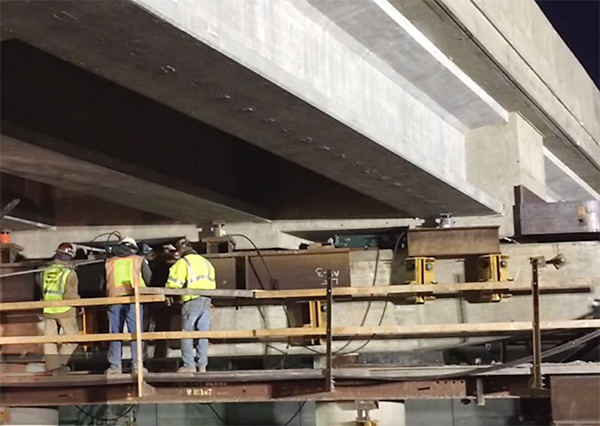February 11, 2016
Innovation of the Month: Smarter Work Zones
Smarter work zones that use innovative strategies to optimize safety and mobility play a key role in ensuring motorist and worker safety and reducing traffic delays. Effective traffic management also helps maintain access to residences and business and gets road work done on time.
 Project coordination involves smarter construction planning that minimizes work zone impacts and results in time and cost savings. Cities and regions are combining multiple projects in an area, correlating right-of-way acquisition and coordinating work among agencies.
Project coordination involves smarter construction planning that minimizes work zone impacts and results in time and cost savings. Cities and regions are combining multiple projects in an area, correlating right-of-way acquisition and coordinating work among agencies.
Technology applications such as queue and speed management involve using intelligent transportation systems for dynamic management of work zone traffic. Queue management systems, coupled with traffic information strategies, alert drivers to work zone backups so they can slow down safely. Speed management solutions such as variable speed limit signs manage work zone traffic based on real-time conditions.
See the Smarter Work Zones Toolkit, a one-stop shop for information on deploying project coordination and technology applications that includes guidance, case studies and training.
Read Smarter Work Zones: Using Strategies to Minimize Delays, Maximize Safety and Mobilityon the EDC-3 effort to promote smarter work zone strategies. The article is in the latest issue of The Signal, a publication by the American Traffic Safety Services Association.
FHWA Offers Data-Driven Safety Analysis Webinar Series
FHWA is hosting a new data-driven safety analysis how-to webinar series. The webinars explain methods, tools and resources that can be used to incorporate safety performance into highway investment decisions. The first webinar, Safety Analysis of Freeways and Interchanges on January 27, included an overview of the new freeway crash prediction methodologies in chapters 18 and 19 of the American Association of State Highway and Transportation Officials Highway Safety Manual. It also demonstrated the Interchange Safety Analysis Tool and Interactive Highway Safety Design Model. The next webinar, Integrating Safety Performance Into All Projects, will be from 1 to 3 p.m. ET on February 18.
States Host Traffic Incident Management Events
A traffic incident management pilot training class was held in Juneau, Alaska, on January 26 with instructors from the Juneau Police Department and Capital City Fire and Rescue. Participants represented the police and fire departments and Juneau citizen’s patrol. The course covered a process to detect, respond to and clear traffic incidents safely and quickly. Future classes will be offered to additional first responders in the capital area, including dispatchers, tow truck operators and Alaska Department of Transportation and Public Facilities staff.
The Michigan DOT hosted an FHWA traffic incident management workshop on January 20 in Muskegon. About 35 first responders from the Muskegon area attended, including representatives from the Michigan DOT, regional organizations, police departments, fire departments, towing companies and FHWA. The workshop focused on a review of incident management capabilities in the area and development of a regional traffic incident management committee.
North Dakota Seeks Innovative Ideas
The North Dakota Department of Transportation is partnering with the Upper Great Plains Transportation Institute on a Transportation Innovations Program. The program’s purpose is to identify and implement innovative ideas in North Dakota DOT transportation projects, processes and products. TRIP is an ongoing program with multiple solicitations each year. February 16 is the deadline for the current call for transportation innovation ideas from industry, associations, universities, tribes, local agencies and North Dakota DOT staff.
Ohio Reviews Lessons Learned on Bridge Slide Project
The Ohio Department of Transportation coordinated a meeting to review lessons learned on the state’s first bridge slide project, which replaced a bridge on I-75 over U.S. 6 in Bowling Green. Staff from the Ohio DOT and FHWA, along with the project designer and contractor, discussed challenges, successes and cost drivers and brainstormed approaches for developing future bridge slide projects.



